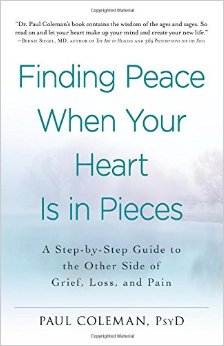Today, SevenPonds speaks with Dr. Paul Coleman, a psychologist who recently wrote a book about loss called Finding Peace When Your Heart Is In Pieces: A Step-By-Step Guide to the Other Side of Grief, Loss and Pain. In part one of our two-part interview, Dr. Coleman talks about how to accept your emotions during the cheery holiday season.
Marissa: What got you interested in writing this book?
Dr. Paul Coleman: I think grief is a common experience and it isn’t necessarily the loss of a loved one. It can be a divorce; it can be moving across country and leaving friends behind. There’s lots of times when our lives get turned upside down, where we have a hard time coping because we have to let something go that was precious to us. I wanted to write about it in a way that brought out concepts and ideas that are not commonly talked about, but that are perhaps more helpful than usual tips on how to cope with loss and grief.
Marissa: What are some examples of ideas that aren’t commonly talked about when it comes to grief?
Dr. Paul Coleman: We’re not talking about a minor loss or a small change. That’s not what the book is about. It’s about things that your life is never gonna be the same after. Also, when you’re feeling like you’re being knocked down a bit, being blown over by the occurrence of the loss. What is not talked about is that this represents a transformative journey that you’re embarking upon. It’s not just a matter of learning how to cope to “get through it” or handle it better. It’s really about realizing this is a journey of personal transformation, and you’re not gonna be the same person anymore. The question is, “Are you going to be a person who’s more enlightened? More passionate? More wise? Or are you gonna be someone who’s more afraid and more cynical?” And the book obviously tries to help people realize that you have a great potential to find meaning and purpose in your life despite your loss, and to transform yourself so that you’re still feeling like life is worthwhile.
Marissa: Can you give any examples of this from your practice or from your personal life?
Dr. Paul Coleman: I think in my own life I’ve had losses. Both of my parents are deceased. I had a sister pass away a couple of years ago. All my kids are grown, but one of them is in law enforcement. There’s always these kind of situations that can be unnerving. I’m in the second half of life, still reasonably young. In the second half of life, you look at things differently than the first half, usually. I’m not about building a new life at this point. I’m about making sense of life and how to find meaning in life when you’ve already done the things you set out to do at age 20 or 25. Have a career, start a family, buy a house. Now what? I realize that there’s still a tremendous amount for us to learn as you get older. You could let go of your health, for example. You might get sick or get certain diseases, and now you’re taking medication. You may be saying goodbye to friends when they pass on. You may be saying goodbye to a career as you get closer to retirement. As you let go of these things, what are you going to do? What are you going to move toward? I want people to understand that every loss is an opportunity for another transformation rather than simply a time for feeling pain and grief, that this is all part of learning life’s lessons. Realizing that as long as we’re alive we have something to accomplish.
Marissa: The holidays are usually associated with happiness and cheer. What are some of the common things you hear from people about their experiences with loss during the holidays?
Dr. Paul Coleman: The traditions aren’t the same. Somebody’s missing at the table. We can’t decorate the tree. Grandpa was always there to put the star on the tree. They often say the traditions don’t feel the same. Another thing I commonly hear is that they sometimes don’t feel it’s OK to feel OK. Maybe they’re getting a kick out of watching little kids open presents. Maybe they find themselves laughing at a joke. They say, “Wait a minute, I can’t do this. So-and-so died, why am I having a good time?” Well of course it’s OK. Give yourself that break because believe me, you’re gonna have plenty of time to be depressed, miserable and unhappy. Allow those things to happen because the person who passed on would want you to have those moments.
Marissa: What tips would you give someone experiencing grief over the holidays?
Dr. Paul Coleman: One is to give yourself permission to feel the range of emotions. Don’t be hard on yourself if you’re saying “Gee I’m gonna let everyone down.” And don’t push yourself to have to keep a smile on your face the whole time. Just understand that you’ll do the best you can, but it won’t be ideal. Secondly, if you’re grieving, try to figure out what it is you might need from family or friends. Fundamentally there are about three things we might need. We might need practical assistance. Can you help me shovel the sidewalk? Can you help me buy food or cook dinners? Can you fix my computer because my husband used to be able to do that, but he’s gone now? Some friends are very good doers and lend a hand. You might need someone to listen. Not everyone’s a good listener. Don’t go to friends and family who you know aren’t good listeners. Some people are gonna turn it around and say, “Oh don’t feel that way, look at the bright side.” That’s not listening. Or they’ll turn it around on themselves. “Oh I know exactly how you feel. That happened to me.” The third thing you might need are distractions. You need someone who says “Look-it, let’s go to a movie.” It’s not that you’re gonna have a good time at the movies, but maybe it’ll take your mind off it. This is a person who’s very good about taking your mind off things. Find out what you need and seek out those people.
Marissa: How do you pick up the pieces after a loss?
Dr. Paul Coleman: I talk about the idea that inner peace can coexist with pain of loss. They’re not mutually exclusive. We do it all the time. We just don’t realize it. We might be sad about somebody who’s passed on, but then we find ourselves telling a funny story. Suddenly we’re laughing, smiling and giggling. You can have some inner peace; that’s what the goal is. The lower self is always fear-based, and it only thinks about what could go wrong, or what if that happens? It keeps you in fear. The higher qualities are the opposite. Those qualities have to do with faith, trust, gratitude, peace, compassion, forgiveness, those kinds of things. We can elevate ourselves to those qualities from time to time, and when we’re there we’re gonna feel more inner peace in spite of the fact that simultaneously we may be feeling a sense of loss. A big one I call is simply acceptance. By that, I mean we have to stop asking the why questions we cannot answer. If we can’t answer those questions, the asking of the questions themselves will only lead to anxiety or agitation. It’s better to say I don’t know the answer and accept. The woman who started Mothers Against Drunk Driving started it because her daughter was killed by a drunk driver. Years later, she’s probably saying, “Had my daughter survived and not been killed by a drunk driver, I never would have done this, and other lives would not have been saved.” It says there can be meaning to suffering. It doesn’t mean this is why it happened, but we can make it meaningful. We can give it a bit of a why. That’s a way to help pick up the pieces.
Marissa: Right, you give your own meaning.
Dr. Paul Coleman: One of my quotes, and I think I’m trying to be too clever (laughs) is “Suffering is bad enough, but the meanest form of suffering is suffering with no meaning.” We try to give meaning. We make it meaningful.
Return here next week for part two of our interview with Paul Coleman, where he talks about why the five stages of grief aren’t valid and how spirituality can lead to better acceptance.
Please come back next week for part two of our interview with Dr. Paul Coleman.

 How Do You Accept Loss During The Holidays? An Interview with Dr. Paul Coleman, Part One
How Do You Accept Loss During The Holidays? An Interview with Dr. Paul Coleman, Part One






 Our Monthly Tip: Make an “In Case of Death” File to Ease Loved One’s Grief
Our Monthly Tip: Make an “In Case of Death” File to Ease Loved One’s Grief
 Passing of Beloved Comedian Births a New Comedy Festival
Passing of Beloved Comedian Births a New Comedy Festival















